UK Artists 1957-77
The very first Eurovision Song Contest in 1956 did not not feature the United Kingdom. However the very same year the BBC organized a “Festival Of British Popular Songs” that took place several months after Eurovision. The winning song was called “Everybody Falls In Love With Someone” performed by Dennis Lotis.
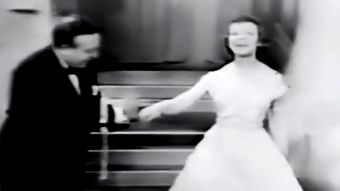
1957 All – Patricia Bredin
The next year the same event was staged but this time the winner would make it to Eurovision. The final was staged on 12 February 1957. Six songs participated after each advanced from one of three semi-finals, and each finalist was performed by two different singers (this practice was adopted by a few other countries too in the early days of the contest). The voting was done by regional juries. Lita Roza, Ronnie Hilton and Bill Maynard (whose son would sing for the UK twenty-nine years later) became the first famous names to try to sing for their native country but fall at the final hurdle. The winner was a light-operatic number that clocked in at just 112 seconds. Patricia Bredin was selected over Malcolm Lockyer to present the song in Europe.
The first UK entrant was a star of musical theatre in the late fifties and early sixties. Her Euro song would remain the shortest in contest history for almost fifty years at one minute and fifty-two seconds (Finland’s 2015 effort finally eclipsed the record). Pat went on to appear in a few comedy films then emigrated to Canada where she concentrated on bringing up livestock.
There was no contest of any type in 1958 so the UK would miss their second contest.
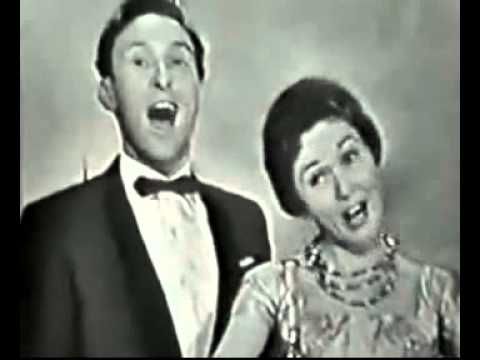
1959 Sing Little Birdie – Pearl Carr & Teddy Johnson
After a years gap, the UK returned in 1959 to begin the longest unbroken sequence of any nation at the contest (France have stormed off in a huff a couple of times and Germany’s record was spoilt by elimination in the 1996 qualifier). The idea of two singers per song was ditched but again there were semi-finals (just two this time). Lita Roza was once more there at the sharp end but had to give way to the first of a long list of chirpy/bouncy UK chosen songs, as presented in this instance by Pearl Carr and Teddy Johnson.
Pearl and Teddy had long careers both as a duo and individually in the fifties and sixties. Teddy was once a DJ on Radio Luxemburg and Pearl had a couple of chart hits with the Keynotes.They have appeared at Eurovision fan conventions quite recently!
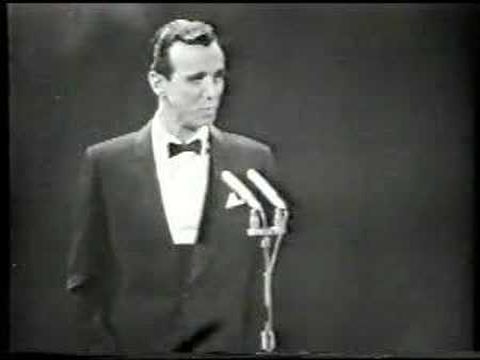
1960 Looking High High High – Bryan Johnson
Encouraged by their strong second place, Pearl and Teddy returned in 1960 but had to give best to Teddy’s brother Bryan. Again there were two semi-finals. Teddy Johnson passed the UK baton to his brother Bryan for the first contest staged in the UK. This light operatic number was his singing highpoint but he was an accomplished stage actor who often appeared in Shakespeare plays. He died in 1995.
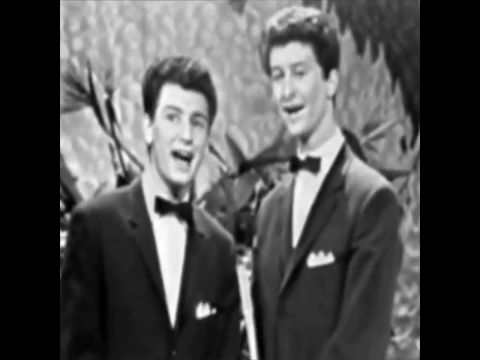
1961 Are You Sure – Allison Brothers
1961 saw the first straight final consisting of nine songs. Like his sibling, Bryan Johnson came back for another stab at glory after a runners-up spot in Europe the year before. As the contest had by now grown in popularity he was faced by quite an array of well-known singers, including Ricky Valance, Craig Douglas, Anne Shelton and Mark Wynter. All had to admit defeat however to the wholesome Allison brothers. Bob Day and John Alford found fame as the Allison brothers and made the trip to Cannes for the 1961 event. They continued as a vocal duo in later decades.
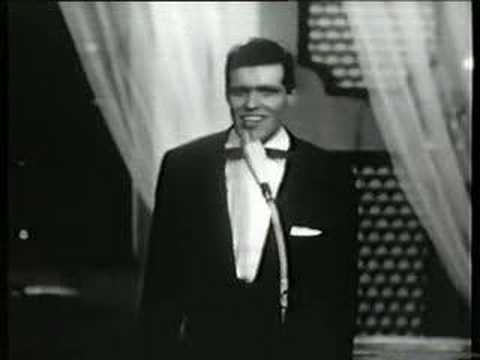
1962 Ring-A-Ding Girl – Ronnie Carroll
More famous singers of their time threw their hat into the ring in 1962, including actor/singer Kenny Lynch, Donna Douglas and Karl Denver. The yodeling Aussie Frank Ifield made his first attempt to represent the UK and conquered all but the winner Ronnie Carroll. Ronnie was a serious crooner who at one time blacked-up in a “Black And White Minstrel Style”. He married actress Millicent Martin and scored a series of hit singles before he won the ticket to the 1962 contest.
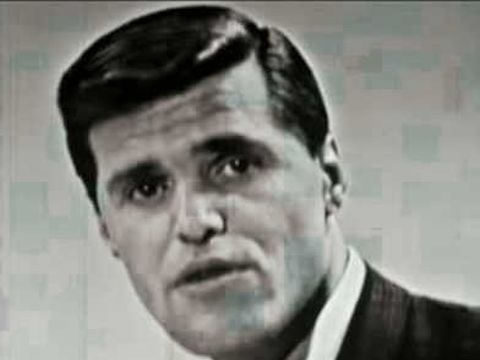
1963 Say Wonderful Things – Ronnie Carroll
Carroll finished fourth in 1962, which was something of a letdown after three consecutive runner-up showings, so he returned to Song For Europe in 1963. Quite remarkably, despite entries from Anne Shelton once more and Vince Hill, he won again and remains to this day the only UK singer to enter consecutive contests. In later years he has gone into politics and stood in UK by-elections for fringe parties as recently as 2008.
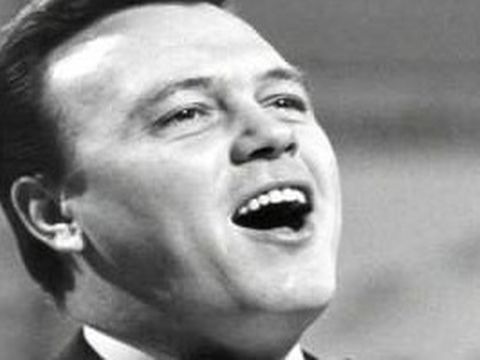
1964 I Love The Little Things – Matt Munro
In 1964 the BBC took a radical step that would change the format of SFE for the next dozen years. One popular singer was signed up to perform all the six final songs before the public. Matt Monro was the first choice, but although his winning song won SFE by a landslide (and was runner-up in the contest), it failed to crack the UK chart and is seldom found on Monro collections. He went on to cover the Austrian entry from the same contest and had a much bigger hit with it as “Walk Away”. He died in 1985.
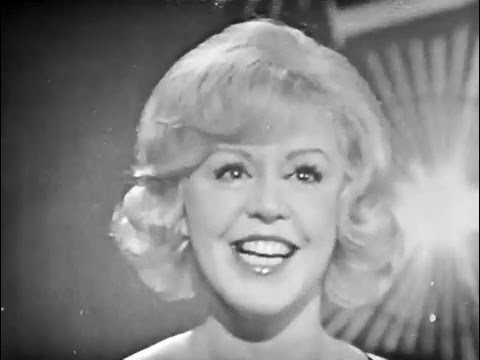
1965 I Belong – Kathy Kirby
In 1965 again the BBC decided on one artist to sing all the songs in the UK final and blonde bombshell Kathy signed up for the task. Her biggest hit was “Secret Love” in 1963, when she was named Top British Female Singer in the NME poll. Another change occurred as the regional juries were replaced by a national postcard vote. This change may have contributed to a much closer margin among the top three songs.
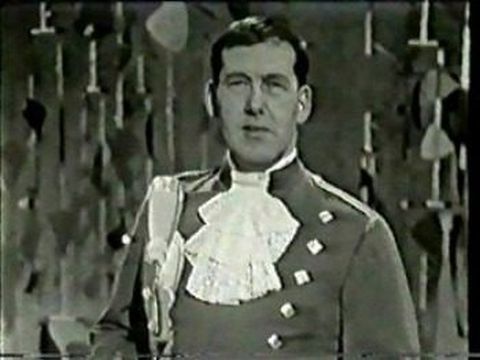
1966 A Man Without Love – Kenneth McKellar
The 1965 Eurovision champion “Poupee De Cire Poupee De Son” can probably be classified as the first “modern” sounding contest winner, so it was quite a surprise when the BBC chose the determinedly old-fashioned Kenneth McKellar for the 1966 event. The number of songs in the final was reduced from six to five. Primarily a classical and traditional singer, and a Hogmanay TV regular, Kenneth took to the Luxembourg stage in a kilt and sang his sweet song to little effect. This remained the worst UK result for more than two decades, so it was clear some modernization was urgently required.
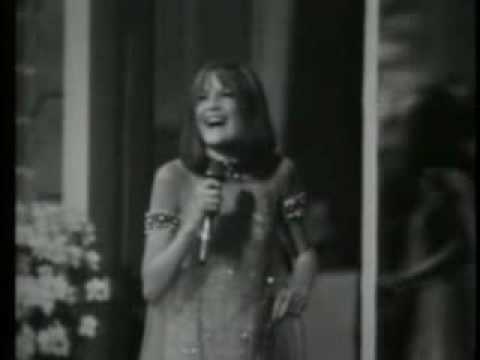
1967 Puppet On A String – Sandie Shaw
By 1967, out went the light-entertainment artists, the hosting by dear old David Jacobs, and in came swinging-sixties pop music and presentation. The Song For Europe became integrated into prime-time Saturday night BBC1. The number of songs remained at five and Sandie Shaw, who was about as cool as it got in 1967, sang them week by week on the Rolf Harris show.
Sandie was of course an absolute superstar in the mid sixties and apparently not best pleased when her management put her forward for Eurovision. The UK (or as presenter said at one point “Great Brittany”) romped to victory in Vienna, and after many decades Sandie seems to have come to terms with the song.
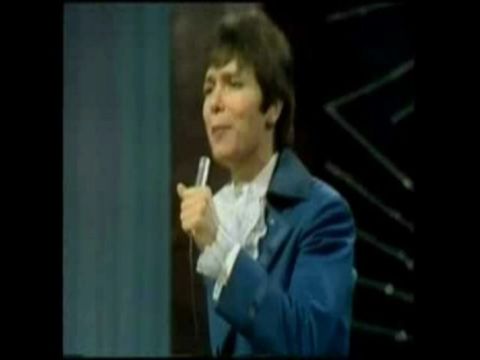
1968 Congratulations – Cliff Richard
After our first victory anticipation was intense as the 1968 contest loomed. The number of songs reverted to six for Cliff Richard to present on the Cilla Black show. As we now know the winning song “Congratulations” went on to become a pop standard, but what’s less remembered is the fourth place song “The Sound Of The Candyman’s Trumpet” whose lyrics contained coded references to some in-vogue illegal substances of the time.
In these golden days of Eurovision our biggest and best turned out for the UK. Cliff was odds-on to win with this timeless classic but saw his lead wiped out by the German jury and thus a bonnie Spanish lass in a mini skirt singing “La La La” ad infinitum pipped him at the post.
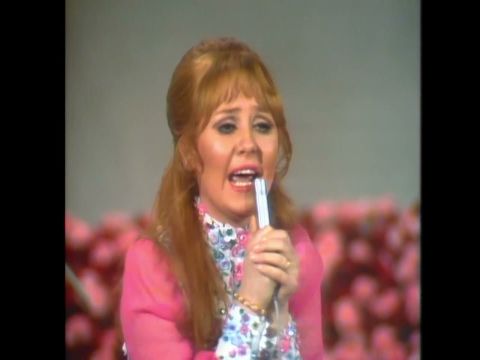
1969 Boom Bang A Bang – Lulu
The first two years of the new style selection were blessed by two very good songs winning that have both stood the test of time. Both were catchy, bouncy and uptempo. One won by a landside and the other was pipped at the post. In the light of this it’s not surprising that British viewers believed that this type of song would be the best bet for UK success, a belief that has taken several decades to wear off.
Lulu had enjoyed film and recording success in the mid sixties and secured her own BBC show and thus was an obvious choice for the contest. She performed six songs on her very own TV show, and despite a variety of styles (including a very early song by Elton John and Bernie Taupin, which came last) the public in their wisdom chose “Boom-Bang-A-Bang”, a song whose title only cemented the genre of song that the BBC audience thought would be most successful. To be fair it DID win, as four countries tied, and there was no tie-breaker in those days to split them. The song has been widely derided but it still appears proudly on compilation albums.
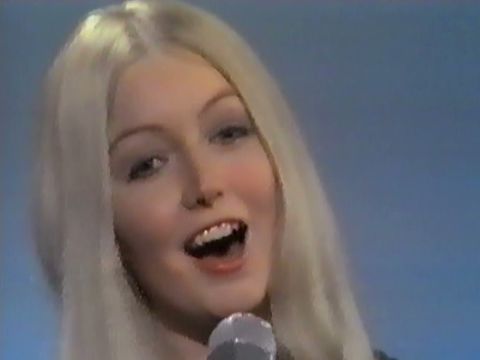
1970 Knock Knock Who’s There – Mary Hopkin
1970 saw Welsh singer Mary Hopkin roped in as her singles career was somewhat on the wane. Six songs were performed on the Cliff Richard show, and to no-ones great surprise, “Knock Knock” followed “Bang A Bang” in the UK lexicon of honour. This would be the one and only time when a Eurovision entry was released on the Beatles Apple label. Folk singer Mary was one of the very first signings to the Beatles Apple label and scored a huge hit with “Those Were The Days”. Two years later she was a strong second behind Dana, and might have won but for Belgium awarding nine out of their ten votes to Ireland.
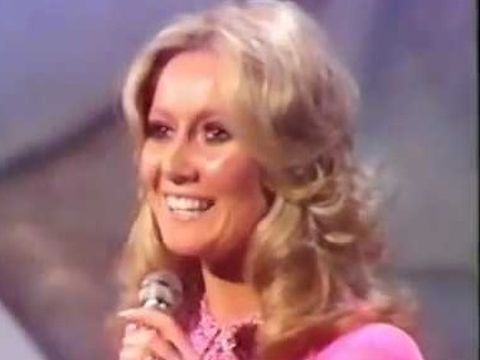
1971 Jack In The Box – Clodagh Rodgers
The 1971 contest was to be in Dublin, and recent events in Northern Ireland had suggested the UK might not get the warmest welcome. After English, Scottish and Welsh vocalists in three previous contests it was Northern Ireland’s turn anyway, and so Clodagh Rodgers was selected, again performing six songs on the Cliff Richard show. True to form “Jack In The Box” was selected, but the song finishing in fourth “Another Time Another Place” was later covered with some success by Englebert Humperdinck. Regional juries returned temporarily this year due to a problem with postal services. Clodagh’s sparkly pink hot-pants helped the UK to fourth, which at the time was only average by UK standards. Clodagh no longer sings but occasionally appears on TV in acting roles.
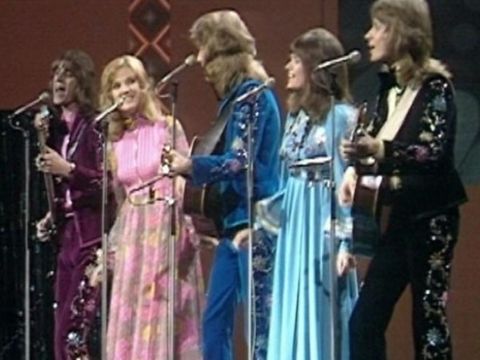
1972 Beg Steal Or Borrow – New Seekers
1972 saw two developments. Firstly the New Seekers became the first group to represent the United Kingdom (the European Broadcasting Union had limited the contest to a maximum of trios until the year before), and secondly there wasn’t even a “Jack-In-The-Boom-Bang-Knock-Knock” style song in the final! The winning song fully deserved it’s victory, but in last place trailed “Songs Of Praise” written by none other than Roy Wood of the Move and Wizzard. The New Seekers were coming straight off a million-seller from a Coke ad, “I’d Like To Teach The World To Sing”. Lead vocals were shared by Lyn Paul and Australian Peter Doyle (who sadly passed away in 2001) who were, it is thought, romantically linked at the time of the contest.
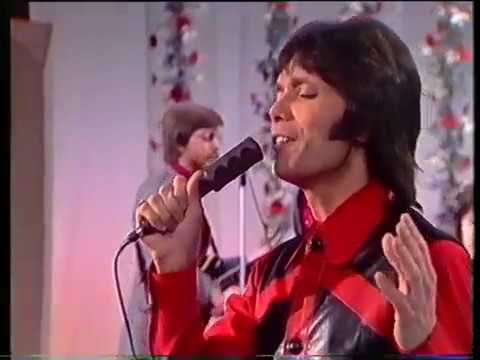
1973 Power To All Our Friends – Cliff Richard
After hosting the last three selections, Cliff Richard returned as the artist in 1973 because, as widely quoted, he needed another hit. He ended up with two. As in 1968 Cilla Black played hostess as SFE was part of her weekly show. The winning song “Power To All Our Friends” polled more votes than the other five songs combined. However Cliff liked the song that finished third “Help It Along” so much that he released it as a single later that year and it charted. Cliff’s second contest performance contained some of the oddest gyrating ever witnessed on a Eurovision stage.
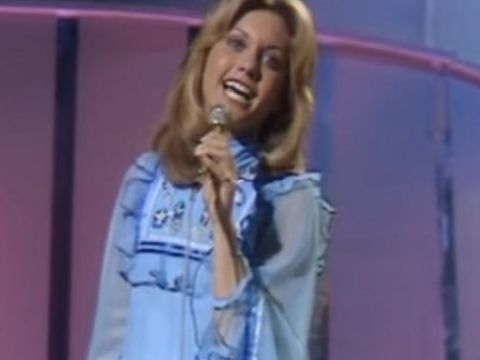
1974 Long Live Love – Olivia Newton-John
1974 saw Olivia Newton-John temporarily plucked from her fledgling career as a US country singer (she had just won a Grammy for “Let Me Be There”) to perform six slices of Euro-cheese on the Cliff Richard show, although the final was hosted by Jimmy Saville. Much like 1969, despite a good variety of songs the cheesiest won through, much to Olivia’s dismay apparently. On to Brighton and a blue nightie in a classic contest. Olivia’s six SFE tracks were ignored by her American record company and happily her budding career was not derailed.
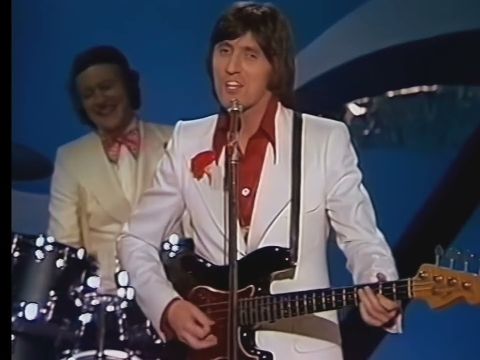
1975 Let Me Be The One – Shadows
1975 saw the last one-artist final for seventeen years. Apparently viewing and voting figures had fallen, and it was getting harder to sign-up big performers to a long commitment of several weeks. The last of these were the Shadows, who performed their songs on Lulu’s show. Apart from the winner the most notable finalist was “Don’t Throw It All Away” which finished fourth, yet went on to be a top twenty hit for it’s composer Gary Benson. Cliff’s old backing band traveled to Stockholm and finished a close second, despite Bruce Welch fluffing his lines at the start of the song.
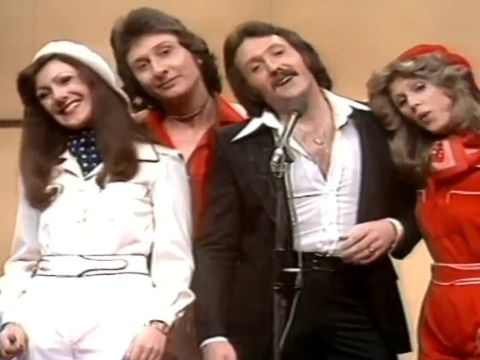
1976 Save Your Kisses For Me – Brotherhood Of Man
Unable to find a big-name artist the BBC opened up Song For Europe to all-comers in 1976. A grand final was staged at the Royal Albert Hall where twelve acts performed for the regional juries. This was also the start of a period when groups would dominate the UK selection. Among the soloists who fell by the wayside were Tony Christie, Tammy Jones, Frank Ifield, making his last attempt to sing for the UK and Hazell Dean making her first. In a bizarre twist Polly Brown first sang solo then as one half of Sweet Dreams. All were bested by a reconstituted Brotherhood of Man, but lets not forget that Eurovision would be missing an all-time classic if just one jury had voted differently!.
The Brotherhood in an earlier incarnation had a 1970 hit with “United We Stand”, by 1972 it’s more famous line-up was in place. After pipping Coco to victory in Song For Europe, they conquered Europe and went on to more success with “Angelo” & “Figaro”. Forty years later they are still performing with the same line-up.
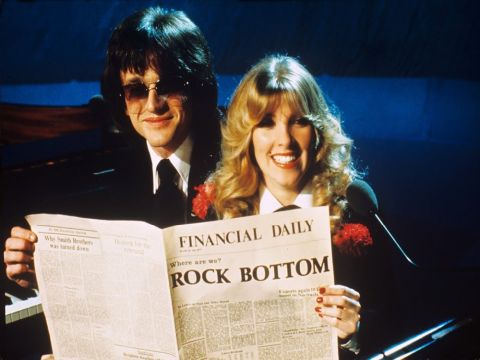
1977 Rock Bottom – Lynsey de Paul & Mike Moran
After such a resounding success the identical formula was used in 1977, and a similarly semi-starry field was present, including Carl Wayne, chart-toppers Sweet Sensation and Lyn Paul, who had sung co-lead for the New Seekers in 1972. Unfortunately a strike at the BBC meant that the contest was not televised (a strike that would even delay the song contest itself later in the year) so Lynsey De Paul and Mike Moran’s song was chosen by the juries purely on the radio broadcast. Ms De Paul had many pop hits in the early seventies including “Sugar Me” and the TV theme “No Honestly”, and was joined for Eurovision by Mike Moran, primarily a composer and record producer. Lynsey herself continued to be successful as a songwriter. Sadly she passed away in October 2014.
